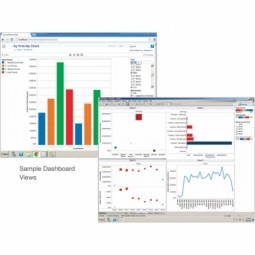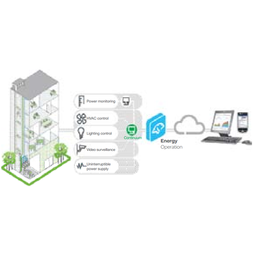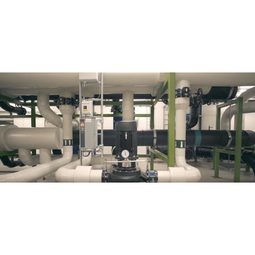Case Studies.
Our Case Study database tracks 18,927 case studies in the global enterprise technology ecosystem.
Filters allow you to explore case studies quickly and efficiently.
-
(51)
- (46)
- (2)
- (2)
- View all
-
(34)
- (27)
- (7)
- (4)
-
(26)
- (17)
- (5)
- (2)
- View all
-
(23)
- (23)
- (6)
- (3)
- View all
-
(17)
- (11)
- (5)
- (2)
- View all
- View all 13 Technologies
- (14)
- (10)
- (8)
- (7)
- (6)
- View all 33 Industries
- (45)
- (27)
- (20)
- (17)
- (14)
- View all 12 Functional Areas
- (44)
- (34)
- (22)
- (17)
- (11)
- View all 36 Use Cases
- (71)
- (36)
- (15)
- (11)
- (9)
- View all 8 Services
- (87)
Selected Filters
87 case studies
|
Asset Management helps NASCAR Drive Down Costs
Schneider Electric
Hendrick Motorsports wanted to coordinate information across 6 warehouses, track usage of approximately 150 components on each car and get the system up and running within four months.
|
|
Maintenance Management pays off for Fertilizer Plant
Schneider Electric
Locate software to deliver continuing maintenance planning functionality while providing the flexibility for growth and costs savings. The investment to keep home-grown application in pace with growing business is over $1 million.
|
|
Energy accountability brings LEED Platinum certification
Schneider Electric
Earth Rangers was looking for partners who could donate equipment and expertise. After earning LEED (Leadership in Energy and Environmental Design) Gold for New Construction certification, Earth Rangers decided to further demonstrate their commitment to reducing energy use and CO2 emissions by pursuing a LEED Platinum for Existing Buildings certification—the highest level of certification offered under LEED.
|
|
Data meets nature: One of the greenest data centers
Schneider Electric
Green Mountain is consuming data at an unprecedented pace: 3 billion Facebook videos viewed daily; 300 hours of video uploaded to YouTube every hour. In today’s data-driven world, the uptime of colocation data centers – vast banks of servers that process everything from online videos to financial assets – is essential. Delivering secure and reliable data center services can come at an environmental cost though: energy use in data centers today contributes to 2% of global CO2 emissions. They want one colocation facility, built in a former NATO bunker buried deep within a mountain, turn the tables and use the power of nature to become one of the world’s most reliable and sustainable data centers.
|
|
Citywide Smart Grid Solutions in Lyon
Schneider Electric
Standardize and showcase a fully operational smart grid for widespread deployment of proven innovative solutions and provide the basis for:• New business models for prosumer• Investment strategies for the French power system to incorporate the latest technological innovations• Transition scenarios to facilitate the evolution of the current network towards a smart grid system• Implementation of findings from multidisciplinary research on optimal technological and economic choices
|
|
Innovative IoT Solution for Aquaculture Waste Management by Blue Ocean Technology
Schneider Electric
Blue Ocean Technology, a company specializing in aquaculture waste management, was seeking an innovative solution to optimize their systems that convert fish sludge into valuable fertilizer. The company aimed to construct a compact system that would minimize both their environmental footprint and power consumption. They also wanted to remotely monitor the drives and motors that manage the pumps in their system. Ensuring the cybersecurity of their plant was another significant challenge they faced. The company was in need of a solution that would not only meet these requirements but also enhance their profitability and sustainability.
|
|
Somic Group: Doubling Output and Reducing Space with IoT
Schneider Electric
Somic Group, a machine builder in the packaging market, was facing several challenges. They were seeking ways to reduce costs and react more quickly to customer requirements, while also improving their service business. The market was demanding more innovative, intelligent, and smarter machines, and Somic wanted to meet these demands by building compact, high-performance solutions that incorporated preventive maintenance with an augmented reality interface. Their customers were looking for reliability, production security, and high availability in machines, which were also priorities for Somic. They aimed to deliver all these features while maintaining a compact technology footprint.
|
|
Digitization of Pharmaceutical Packaging Machines: A Case Study of CVC Technologies
Schneider Electric
CVC Technologies, a leading manufacturer of pharmaceutical packaging machines, was seeking an end-to-end IoT solution to fully digitize their pharmaceutical liquid filling and capping machines. The company aimed to enhance the safety of their equipment, introduce digital maintenance capabilities, and gain visibility into machine status from anywhere at any time. The challenge was to find a solution that could provide real-time visibility into the machine's status, deliver direct cloud connectivity and digital services, and simplify all aspects of the machine's lifecycle, from engineering to maintenance.
|
|
Tata Power's Digital Self-Healing Grid Revolution with EcoStruxure™ Grid
Schneider Electric
Tata Power, a leading utility provider in India, was faced with the challenge of restoring power to 350,000 households within seconds. The company identified two major challenges in delivering reliable power: unknown theft areas (commercial losses) and improper quantification at the point of occurrence due to lack of real-time data, and operational flexibility with a rigid and evolved grid that was overutilized and had increasing power demand with poor power demand planning. The goal was to develop a robust supply network that could support growth in the customer base, minimize revenue losses, and dramatically reduce restoration times.
|
|
IoT Integration in Traditional Taverns: A Case Study of Arroka Bar
Schneider Electric
Arroka Bar, a traditional Basque tavern located in San Sebastian, Spain, is a family-run business that operates six days a week, serving breakfast, lunch, and dinner. The bar's owner, Manuel Herrero, was concerned about the potential for equipment downtime and the subsequent loss of business continuity. The unexpected loss of power could have serious financial implications for the business. Herrero needed to ensure that all refrigerators were running to keep ingredients fresh, the coffee machine was heated up 30 minutes before the first client walked in, and the bar's air conditioning and lighting were working to ensure customer comfort. He also needed to stay alert and ready to solve unexpected issues. Herrero was looking for a solution that would provide remote control of individual electrical devices, insight into the electrical network condition, and notifications in case of issues.
|
|
Livetech's Efficient Robotic Packaging Systems: An IoT Case Study
Schneider Electric
Livetech, a company that designs and manufactures robotic packaging systems for the food industry, was facing several challenges. The company needed to reduce the changeover time of its machines to enable faster time-to-market for its mechatronic module machines. Additionally, Livetech was seeking ways to optimize energy consumption of its machines to make them more sustainable and efficient. The company also wanted to reduce the physical footprint of its machines without compromising their performance. These challenges required a high-performance digital solution that could enhance the efficiency and sustainability of Livetech's robotic packaging systems.
|
|
ACMA's Journey to Higher Productivity with IoT
Schneider Electric
ACMA, a Coesia company, is a leading firm in the design and construction of automatic packaging machines for consumer goods. Despite their success, they faced a significant challenge in developing a new flexible, smart, and high-speed automatic feeding system for their wrapping machines. The company needed to ensure faster time-to-market, a smaller footprint, and higher productivity. The challenge was to find a solution that could meet these requirements while also being sustainable and flexible. The company had been partnering with an undisclosed firm for over two decades, implementing their motion control and industrial automation solutions. However, the need for a more advanced solution was evident to keep up with the evolving market demands and to maintain their competitive edge.
|
|
Aquapolo: Enhancing Water Security and Efficiency with IoT
Schneider Electric
Aquapolo, Brazil's largest wastewater treatment plant, was faced with a significant challenge. The local community was experiencing a severe shortage of potable water, and there was an increasing demand for water for industrial use. Aquapolo was tasked with managing 20 different Key Performance Indicators (KPIs) related to water quality and quantity. The plant also needed to reduce production costs and improve operational efficiency. The challenge was not only to meet the immediate water needs of the community and industry but also to ensure sustainable and efficient water management for the future.
|
|
Chais Monnet: Enhancing Comfort and Efficiency with IoT
Schneider Electric
Chais Monnet, a new hotel located in the heart of historic vineyards, faced several challenges in developing a Building Management System (BMS) and an energy-consumption monitoring system. The hotel, which boasts 92 rooms, 14 apartments, a restaurant, a seminar room, a spa, and a swimming pool, required a system that was not only intuitive and user-friendly but also capable of communicating with all technical batches including domestic hot water, electricity, heating, lighting, and air handling unit. The challenge was further complicated by the need to ensure quality aesthetics of the equipment and the finishing of the wiring and thermostats, to comply with the requirements of a listed historic building. Additionally, the hotel wanted to provide its international clientele with the ability to control comfort parameters from their rooms.
|
|
DataXion: Enhancing Efficiency and Reducing Energy Consumption with EcoStruxure
Schneider Electric
DataXion, the largest data center in North Africa, was faced with the challenge of ensuring energy optimization and maximizing energy consumption while achieving a Power Usage Effectiveness (PUE) of 1.6. Given the climate, energy consumption was the primary challenge for this data center. The task was not only to manage the energy consumption but also to provide the best choice of equipment and solutions to implement. The challenge was to find a solution that could provide a safe and consistent power supply, maximize system efficiency, improve energy efficiency within the data center, and provide precise air handling for the proper operation of IT equipment.
|
|
Lippulaiva: A Case Study on Intelligent Energy Management
Schneider Electric
The case study revolves around the challenge of managing energy resources efficiently in a large property, Lippulaiva. The property, owned by Citycon, a top Nordic owner of city centers, had a large geothermal energy plant for heating and cooling. However, the challenge was to reduce CO2 emissions and make the city center the most environmentally responsible and friendly in Europe. The need was to control and optimize energy flows, combining building technology and business information, and continuously monitor all building technology systems.
|
|
Padania Acque: A Case Study on Smart Water Management
Schneider Electric
Padania Acque, a water services provider for 113 municipalities in the Italian province of Cremona, was facing challenges in managing its water supply system. The company was struggling with high water losses, which were significantly above the national average. This was not only leading to wastage of a precious resource but also impacting the company's financial performance. The traditional methods of control and management were proving to be inefficient, leading to operational inefficiencies. The company was in dire need of a solution that could help it monitor and optimize its entire water supply system, and enable it to take predictive actions to ensure reliable and sustainable operations for its customers.
|
|
Improving Sustainability and Efficiency in Cement Production: A Case Study of CNBM
Schneider Electric
China National Building Material (CNBM), a company responsible for producing one out of every ten tons of cement in the world, was faced with a significant challenge. The company sought to enhance its sustainability and optimize its operations. The primary objectives were to manage its energy usage effectively, reduce operational costs, improve profitability, and minimize environmental pollution. The challenge was to achieve these goals without compromising the quality of the cement produced or the efficiency of the production process.
|
|
Henkel's Journey to Enhanced Energy Efficiency and Process Optimization
Schneider Electric
Henkel, a global leader in consumer goods and chemicals, was facing a significant challenge in optimizing its energy-intensive spray drying process in detergent production. The process was not only consuming a substantial amount of energy but also lacked the efficiency required for a streamlined production process. The company was in dire need of a solution that could modernize this process, conserve valuable resources, and contribute to its sustainability goals. The challenge was to find a system that could seamlessly integrate with their existing infrastructure and provide real-time insights for better decision-making.
|
|
Sophim: Enhancing Production Agility and Efficiency with Universal Automation
Schneider Electric
Sophim, a manufacturer of natural ingredients for the cosmetics industry, was faced with the challenge of modernizing its automation systems. The company sought to upgrade its legacy automation systems to an Industry 4.0 solution in a managed, low-risk, and agile manner. The new solution needed to provide clean integration of IT technologies, with a particular focus on predictive maintenance. Additionally, Sophim wanted to leverage external engineering expertise without introducing project or solution complexity. The task of implementing this solution was given to Alliance system integrator partner Master Systèmes.
|
|
Implementing a green clean-in-place process
Schneider Electric
Nestlé Waters, the world leader in bottled water, operates a factory in Vergèze, France, where it manufactures its iconic Perrier brand. The factory has 13 production lines and an installation comprising several hundred meters of pipes. To ensure the high quality of Perrier water, Nestlé Waters needed a clean-in-place (CIP) process that meets best-in-class standards. Traditional cleaning performed during a period of machine shutdown represented 20% of the working time of the facility and impacted operational efficiency. Nestlé Waters was looking for a solution that would help them win back some time for production while maintaining product quality and compliance with food safety regulations.
|
|
The sweet taste of digitization
Schneider Electric
Yunzhibao Foodstuff Co., Ltd., a candy producer in China, was facing challenges due to the manual nature of its production and management processes. The company's operations lacked transparency, and data credibility was compromised due to the handover process between shifts. The company also heavily relied on individual workers, and the inability to capture and accumulate their knowledge and experience was a vulnerable point in Yunzhibao’s operations. The company needed to automate these processes, improve their standardization, and ensure product quality. They also needed to eliminate the 'black box' state of their operations and production, and make all product-related process knowledge transferable.
|
|
Playing it cool
Schneider Electric
Oxford Energy Solutions Inc., a Canadian company, has been designing and building refrigeration equipment for various sectors since 2006. The refrigeration sector is relatively conservative, with many facilities still running systems that were installed 50 years ago. Maintenance is usually done reactively by replacing broken parts like valves and compressors without addressing bigger issues. Oxford Energy wanted to change the way refrigeration systems are built and maintained in line with its ethos of energy conservation and sustainability. The company was looking for a flexible, holistic platform that would enable it to bring its vision of control and integration to the market.
|
|
Green MV switchgear advances Renault Group’s goal of a more sustainable future
Schneider Electric
Renault Group, a multinational automobile manufacturer, is transforming its Flins, France factory into the first European circular economy plant dedicated to mobility. The goal is to achieve a negative CO2 balance at the plant by 2030. However, the company faces challenges such as power reliability and cybersecurity. Any power supply failure can cause a major critical event that can have serious consequences for the site’s activity. An outage can cause safety risks, halt the manufacturing process, which can lead to vehicle damage, cause financial losses due to the vehicle damage, and result in late deliveries to customers. In addition, Renault Group must focus on improving cybersecurity because a cyber breach could be devastating to the Flins factory’s operations.
|
|
Edge computing helps jewelry retail chain set “gold standard” in customer service
Schneider Electric
Tanishq, a leading Indian jewelry retail chain, was looking to modernize its store infrastructure to better accommodate a growing surge in high-end customer traffic. They needed a new edge computing solution that could be managed remotely without disturbing staff workflow or the customer shopping experience. The store’s supporting IT infrastructure had to be reliable and running at all times, providing staff members with the product information they need at their fingertips, and without delay when a customer is ready to purchase. The company also wanted to incorporate more efficient IT and physical infrastructure equipment across their hundreds of retail stores. Their digital transformation and renovation efforts focused on improving the in-store customer experience while increasing operational savings.
|
|
Bridging the digital divide
Schneider Electric
Leading Edge Data Centres wanted to bring stable, reliable, cost-effective connectivity to regional Australia. The company needed a technology partner that could design and build a reliable prefabricated and certified edge data centre, which could be replicated quickly in multiple regional sites around Australia. The team was also looking for a company that could provide a network of engineers to support these sites into the future. A huge challenge for Leading Edge Data Centres is that the distance between its sites makes cost-effective, in-person monitoring almost impossible. Furthermore, most of its sites are greenfield locations, and as a result, power infrastructure is limited. For these reasons, it needed a reliable solution, backup redundancies, and remote access. Leading Edge Data Centres also required an energy monitoring system to accurately track and report in real time the usage of hundreds of customers.
|
|
Tradition and innovation in perfect harmony
Schneider Electric
Mulino Marino, a family-run mill in northern Italy, recognized the need to increase its production to keep up with growing demand. The changes in consumer tastes and purchasing behavior in recent decades presented new challenges: How to be more attentive to market demands for more sustainability, traceability, and organics, as well as to increased requests for alternative multigrain and multi-seed flours, which required the development of new recipes, processes, and products. These challenges, coupled with a dearth of experience and expertise amongst the younger generation of workers, highlighted the need to incorporate new technologies. The company’s strong sustainability ethos and its concern for a depleted earth also drove it to invest in energy management solutions such as solar panels, with the rest of its energy requirements coming from other renewable sources.
|
|
Safety and Consistency : CVC Teams up with Schneider Electric for Digital Transformation
Schneider Electric
CVC Technologies, a leading pharmaceutical packaging machine company, was looking to introduce digitization into their production processes to provide the best manufacturing equipment for customers. They aimed to increase their solutions to customers, reduce downtime, increase efficiency, and minimize human errors. The company was focused on introducing new packaging equipment to meet the changing needs of their customers. Their customers needed a fast and reliable way to contact CVC or the plant technicians if there were any issues with machinery or general problems.
|
|
Quenching a growing thirst
Schneider Electric
Kunming CGE Water Supply (KMCGE) services a population of nearly four million residents with its 10 treatment plants, with a total water supply capacity of 1.58 million cubic meters per day, and a water distribution network that stretches over more than 4,000 kilometers. As the city grows, KMCGE must also continue to expand the scale of its water supply. Delivering a safe and stable water supply while optimizing production and operational efficiencies are the challenges faced by most water utilities. To make sure it could support the rapid urban development of Kunming, KMCGE recognized that it needed to leverage the power of digitization to effectively manage its water supply. It sought to tap into the rich cache of available data to coordinate network pipe pressure, the rational distribution of water resources, and better energy management.
|
|
A clear view of power management
Schneider Electric
Guardian Glass, a leading glass manufacturer, was facing a challenge with its power reliability and efficiency. The company's 750,000-square-foot plant in Dewitt, Iowa operates a furnace at 2,800 ºF to pull approximately 700 tons of glass per day, every day, around the clock. The furnace is critical to the plant’s operation and any shutdown is unacceptable. However, the plant suffered a capacitor bank failure that caused the plant’s power factor to drop below the threshold where the company could claim valuable credits on its monthly energy bills. The loss of savings from the credits persisted for more than two years. Guardian Glass needed to improve its power factor over 95% to receive a monthly credit on utility bills.
|








